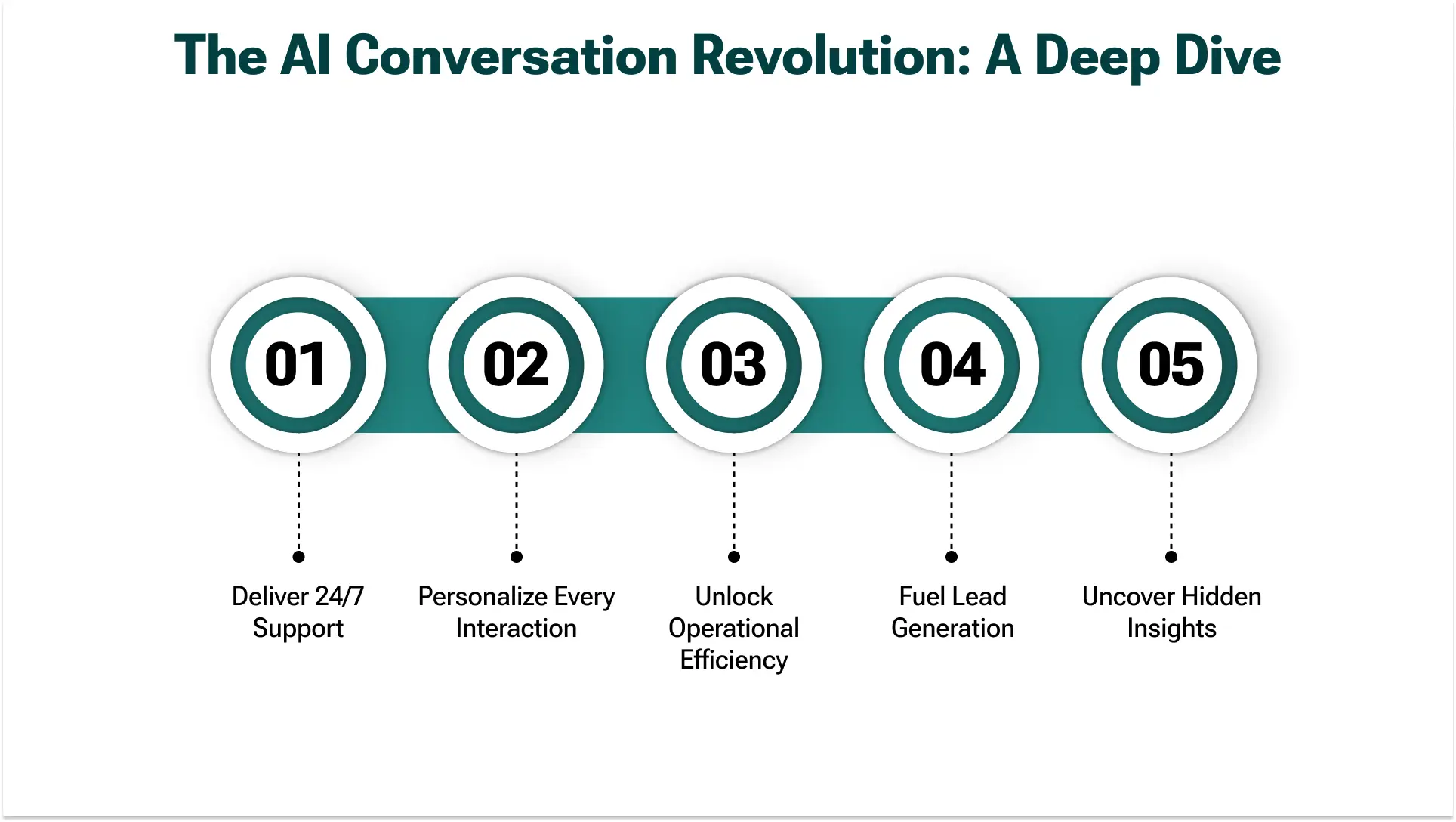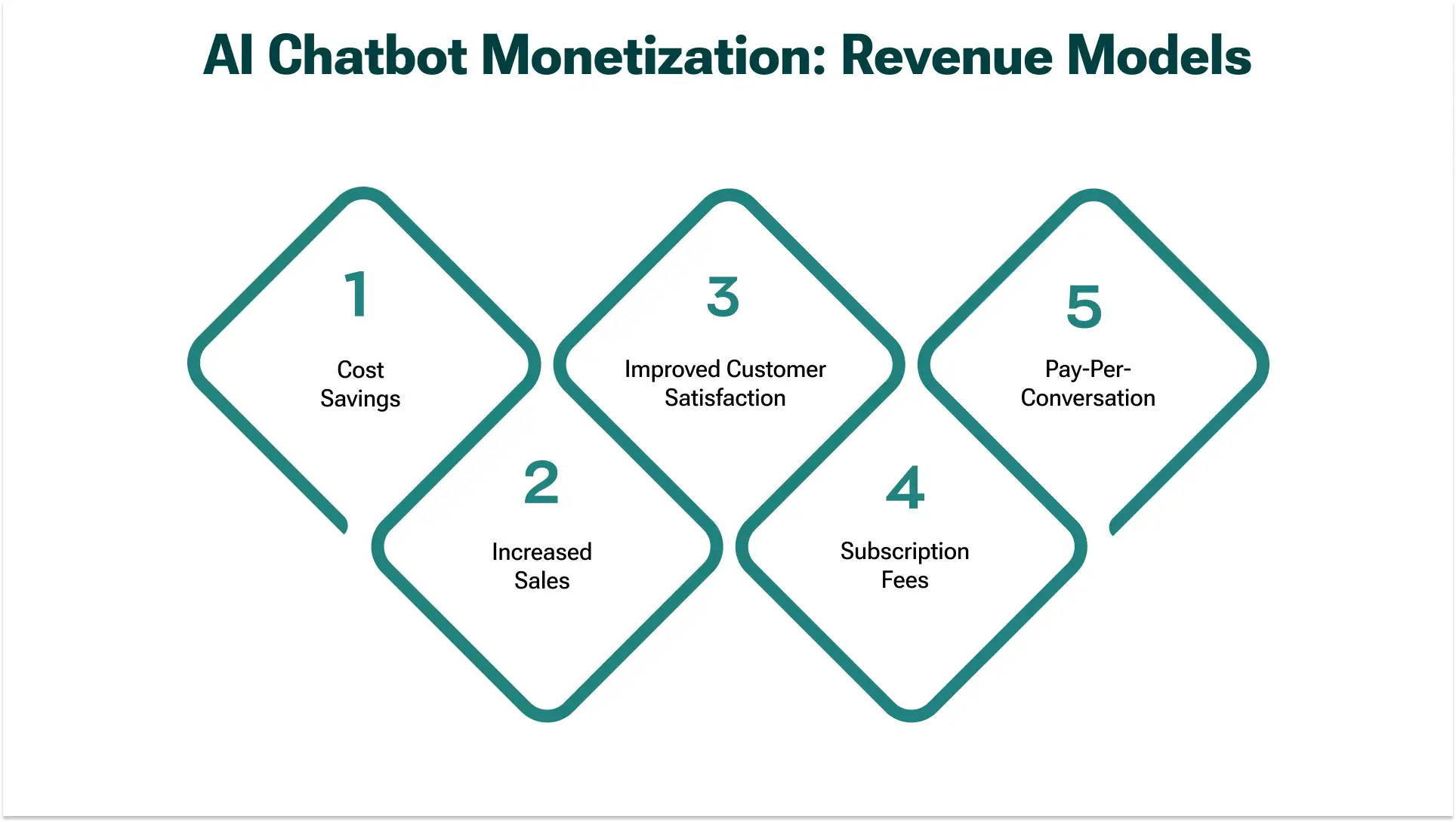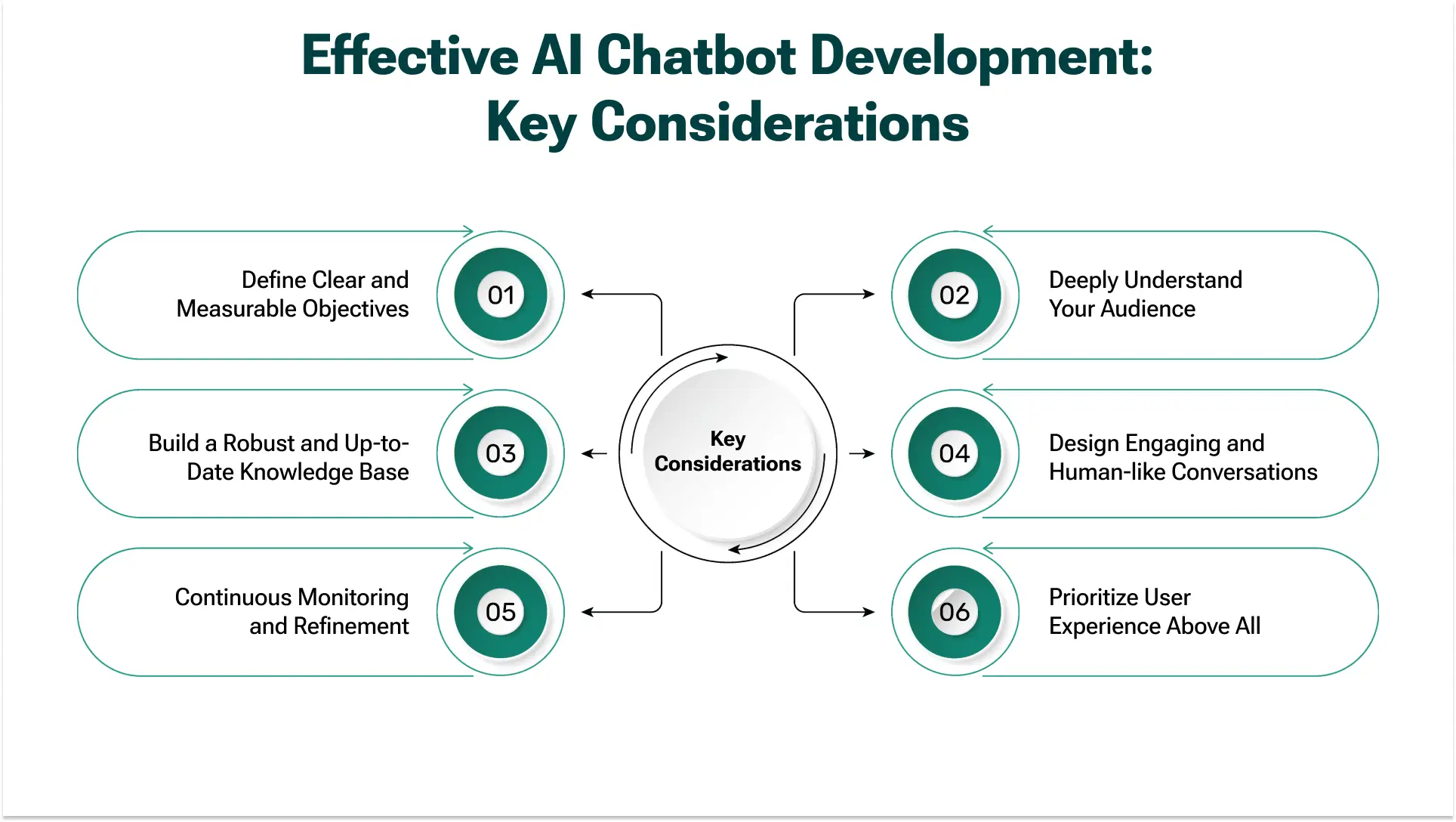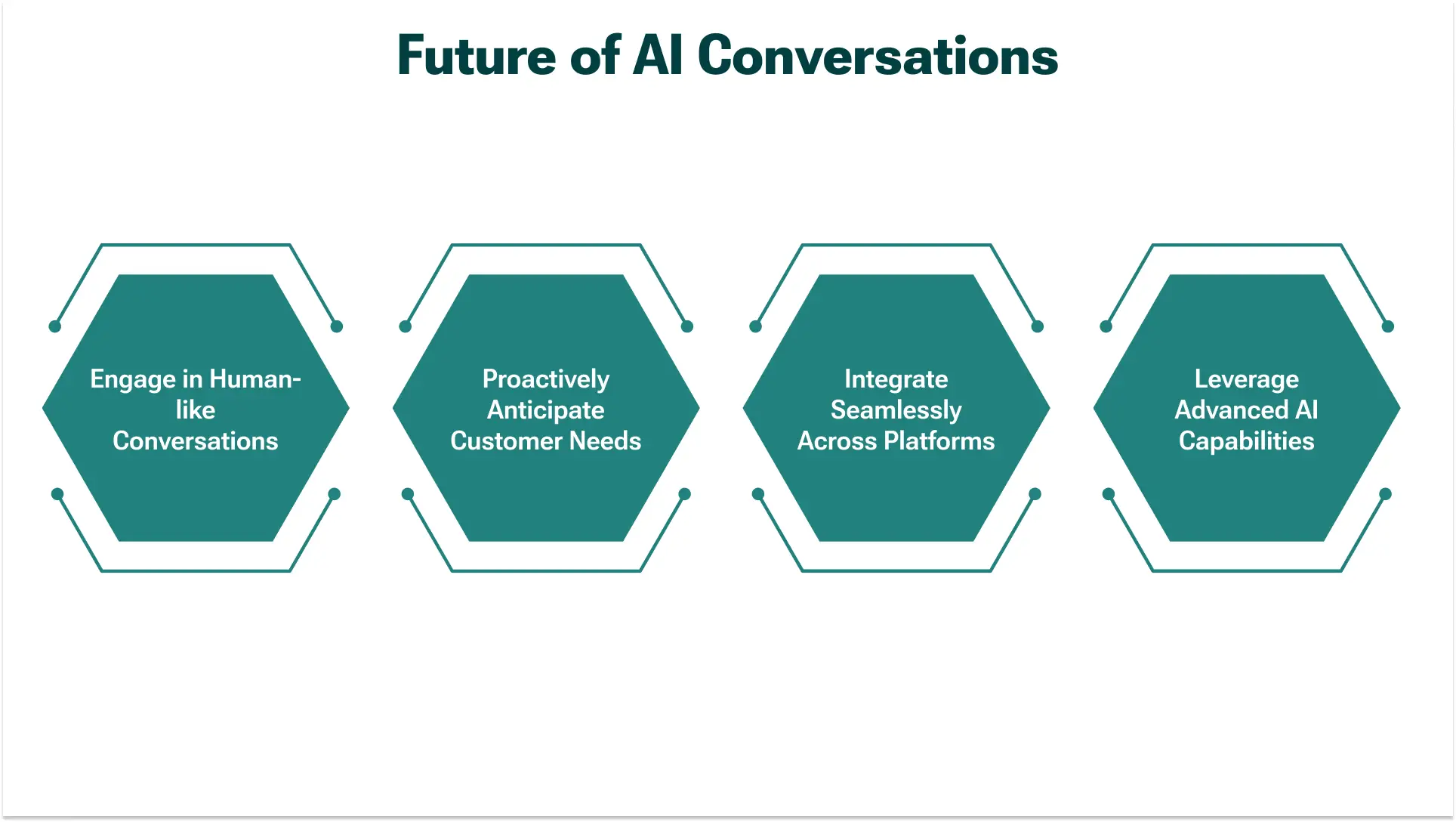Conversational AI solutions are no longer a futuristic concept but a critical component of successful customer engagement strategies. By leveraging the power of AI chatbots for revenue growth, forward-thinking businesses can streamline operations, enhance customer experiences, and unlock new revenue streams.
This blog will delve deeper into the transformative potential of AI-powered conversations, exploring key considerations for startups and enterprises and outlining proven strategies for monetization.
The Power of AI-Powered Conversations: A Deep Dive
In today's fast-paced digital world, businesses are constantly striving to improve customer experiences, increase efficiency and revenue optimization with AI-driven chatbots. Conversation with artificial intelligence offer a powerful solution to these challenges, enabling companies to:

Deliver 24/7 Support:
AI chatbots operate tirelessly, providing instant support to customers across different time zones. This ensures consistent and prompt responses to inquiries, resolving issues efficiently and improving overall customer satisfaction.
For instance, an e-commerce business can launch a chatbot to hand responsibility for answering customer inquiries as well as general questions such as transport tracking, returns, and shipments to human agents, making them available for engagement in more personalized services or handling their thornier issues. With this chatbot, the possibility of greater operational efficiency through highly available AI-powered services in customer experience is beyond doubt.
Personalize Every Interaction:
Forget the days of monotonous, 'one-size-fits-all' communications with a customer. Conversational AI solutions empower businesses to deliver much more specific and personalized experiences. AI chatbots can read customer data, from purchase history to browsing behavior and more, and personalize the conversations to that understanding.
These form a new class definition that uses conversational AI to develop customer retention and increase trust and loyalty. For instance, a travel company can ask a chatbot to provide personalized travel packages according to the customer's budget, travel dates, and destinations. Personalization features really improve the value of customer service and enhance conversion rates.
Unlock Operational Efficiency:
Repetitive tasks can drain your team's valuable time and resources. AI chatbots can effectively automate these tasks, freeing up your human workforce to focus on more strategic and impactful activities.
For example, a financial institution could deploy a chatbot to answer customers' frequently asked questions about account balance, transaction history, or the offerings and services of the bank, making customer service representatives available to answer more complex questions.
Fuel Lead Generation:
The customer experiences intensify due to available brands. The only solution that could be very lucrative for lead-generating assistance is offering interactive chats with the contacts where needs, preferences, and pain points are gathered. This information is then utilized to engage efforts to help qualify those leads. With enough lead qualification and targeting high-value prospects, AI-driven strategies will be crucial in trade growth.
For example, the software company could have chatbots identifying the budget and needs of potential customers in order to qualify leads on its website. This chatbot would then segregate leads and adequately route them to the most relevant salespeople.
Uncover Hidden Insights:
Every conversation with a customer provides valuable insights. AI-enabled chatbots can effectively capture and analyze this data, providing businesses with a wealth of information about customer behavior, preferences, and pain points. This data can be used to improve product development, refine conversational marketing with AI strategies, and enhance overall customer experience.
For example, a retail company could use chatbot conversation analysis to understand product categories, typical customer complaints or disconnects, and areas for growth. This information could then be used to improve product offerings, strengthen customer service functions, and drive sales growth through AI-driven sales strategies.
Key Benefits of AI in Customer Conversations
Harnessing the power of AI-generated conversation and intelligent AI conversations offers significant advantages for revenue growth. These technologies enable:
- Increased Efficiency and Scalability in handling customer inquiries.
- Personalized and Engaging Customer Experiences.
- Faster Response Times and 24/7 Availability.
- Actionable Insights derived from conversation data.
- Reduced Operational Costs through automation.
- Improved Lead Qualification and Sales Conversion.
- Consistent and Brand-Focused Communication.
The landscape of customer support is evolving, with AI-powered conversations offering a distinct alternative and complement to traditional human-led support. Here's a comparison of the key differences:
Feature | AI-Powered Conversations | Traditional Customer Support |
Availability | 24/7, always available | Limited by agent working hours and staffing levels |
Scalability | Highly scalable, can handle a large volume simultaneously | Scalability is dependent on the number of available agents |
Response Time | Instant or near-instant responses | Response times can vary depending on queue lengths and agent availability |
Cost Efficiency | Lower operational costs for routine inquiries | Higher labor costs associated with staffing and training |
Personalization | Data-driven personalization based on available information | Personalization relies on individual agent skills and memory |
Consistency | Consistent and brand-aligned messaging | Consistency can vary between different agents |
Handling Routine Tasks | Excellent at handling repetitive and predictable queries | Agents may spend significant time on routine tasks |
Handling Complex Issues | May struggle with novel, nuanced, or emotionally charged situations, requiring escalation | Human agents excel at understanding and resolving complex issues requiring empathy and critical thinking |
Learning & Improvement | Learns and improves over time with more data and training | Improvement relies on agent training and experience |
Data Collection & Analysis | Automatically collects valuable data on interactions | Data collection often requires manual effort and analysis |
Emotional Intelligence | Lacks genuine empathy and emotional understanding | Human agents can build rapport and empathize with customers |
Human Touch | Can feel impersonal if not implemented thoughtfully | Provides a human connection and personalized interaction |
Error Potential | Can make errors due to misinterpretation or insufficient training data | Errors can occur due to human mistakes or lack of knowledge |
In essence:
- Conversation with artificial intelligence excels at efficiency, scalability, and handling routine tasks consistently and cost-effectively. They leverage data for personalization and provide 24/7 availability.
- Traditional customer support shines in handling complex, novel, and emotionally charged situations where human empathy, critical thinking, and problem-solving skills are crucial.
By understanding the distinct advantages and limitations of each approach, businesses can strategically implement AI conversations to enhance their customer support operations and deliver a superior overall experience.
Now, let's explore how AI-powered conversations increase revenue and empower businesses of all sizes.
Conversational AI Solutions: Empowering Businesses of All Sizes
Conversation with artificial intelligence offers the best AI tools to navigate the complexities of the modern marketplace. By embracing conversational AI solutions, businesses can unlock a range of benefits, from enhancing customer experiences to optimizing operational efficiency.
Startups, often constrained by limited budgets and resources, can leverage AI chatbots as a powerful ally. These intelligent assistants can act as virtual customer service representatives, providing instant support and resolving common queries 24/7. This not only reduces the need for a large, in-house support team but also ensures consistent customer service, even during periods of rapid growth. Furthermore, AI chatbots can effectively qualify leads, identify potential customers, and nurture relationships, accelerating customer acquisition and driving sustainable growth.
Enterprises, with their vast customer bases and complex operational needs, can also significantly benefit from AI-powered customer interactions. Conversational AI solutions for businesses can handle a high volume of customer inquiries, reducing wait times and improving overall customer satisfaction. By analyzing customer data and tailoring interactions to individual needs, enterprises can build stronger, more personalized relationships with their customers. This not only enhances the customer experience but also fosters greater brand loyalty and increases customer lifetime value.
Monetizing AI Chatbots: Exploring Revenue Models
While the benefits of conversational AI for sales growth are numerous, it's essential to consider how to monetize these investments. Here are some proven revenue models that can help businesses leverage AI chatbots for revenue growth:

- Cost Savings: By automating repetitive tasks and reducing the need for a large customer service team, AI chatbots can generate significant cost savings. These savings can be reinvested in other areas of the business, such as product development, conversational marketing with AI, and innovation.
- Increased Sales: AI chatbots can significantly increase sales conversions by qualifying leads, personalizing interactions, and providing 24/7 support. For example, an e-commerce company can use a chatbot to provide personalized product recommendations, answer customer questions, and assist with the checkout process, leading to higher conversion rates and unlocking revenue with conversational AI.
- Improved Customer Satisfaction: Satisfied customers are more likely to become repeat customers and advocate for your brand. By enhancing the customer experience through AI-powered conversations, businesses can improve customer satisfaction, leading to increased customer loyalty and repeat business.
- Subscription Fees: Many conversational AI solution for business platforms offer subscription-based pricing models. Businesses can subscribe to these platforms and pay a recurring fee to access the platform's features and functionalities.
- Pay-per-Conversation: Some platforms offer a pay-per-conversation model, in which businesses are charged a fee for each interaction between a customer and the chatbot. This model can be particularly beneficial for companies with fluctuating customer support needs.
Choosing the Right Conversational AI Solution
Selecting the right conversational AI solution for businesses is crucial for achieving optimal results. Here are some key factors to consider:
- Industry-Specific Features: Ensure the platform offers features and functionalities that cater to the specific needs of your industry. For example, a healthcare provider would require a platform that complies with HIPAA regulations and integrates with electronic health records.
- Scalability: Choose a platform that can scale with your business as it grows. The platform should handle increasing conversation volumes and accommodate new features and functionalities as your needs evolve.
- Ease of Use: The platform should be user-friendly and easy to integrate with your existing systems, such as your CRM and customer support platforms. This will ensure a smooth implementation and minimize disruption to your existing workflows.
- Security: Data security is paramount. Ensure the platform prioritizes data security and complies with relevant regulations, such as GDPR and CCPA. This will protect sensitive customer information and build trust with your customers.
- Cost: Consider your budget and choose a platform that offers a pricing model that aligns with your needs and budget. Evaluate the long-term value proposition and ensure the platform provides a strong return on investment.
Building Effective AI Chatbots: Key Considerations
Crafting a truly effective AI chatbot requires a meticulous approach that goes beyond simply implementing technology. It necessitates a deep understanding of your target audience, a well-defined strategy, and a commitment to continuous improvement.

Here are some key considerations for building AI chatbots that deliver exceptional customer experiences and drive tangible business outcomes:
Define Clear and Measurable Objectives:
Before embarking on chatbot development, clearly define your objectives. What specific business goals do you aim to achieve? Are you looking to improve customer satisfaction, reduce operational costs, increase sales conversions, or gather valuable customer insights? By setting clear, measurable, achievable, relevant, and time-bound (SMART) objectives, you can ensure that your chatbot development efforts are aligned with your overall business strategy.
Deeply Understand Your Audience:
Acquiring a thorough comprehension of your target audience is crucial. Examine their demographics, preferences, communication methods, and challenges. This vital information will shape the chatbot's character, manner of speaking, and the kinds of interactions it should promote. Customizing the chatbot's replies and dialogue patterns to fit your audience's specific traits will boost engagement and strengthen customer connections.
Build a Robust and Up-to-Date Knowledge Base:
A comprehensive and up-to-date knowledge base is the foundation of an effective AI chatbot. This knowledge base must include a diverse array of information, such as frequently asked questions, product details, troubleshooting instructions, company guidelines, and any other pertinent information. Consistently refresh the knowledge base to maintain precision and meet changing customer requirements.
Design Engaging and Human-like Conversations:
The secret to effective chatbot interactions lies in crafting a captivating and human-like conversational experience. Use a conversational tone that connects with your intended audience. Incorporate humor, tailored greetings, and understanding language to establish rapport and enhance a favorable user experience. Include components such as quizzes, multiple-choice questions, and tailored suggestions to foster engaging interactions.
Continuous Monitoring and Refinement:
Creating chatbots is a continuous process. Ongoing observation and improvement are essential for guaranteeing peak performance and attaining intended results. Monitor essential metrics like customer satisfaction, interaction volume, resolution rates, and customer involvement. Analyze this data to identify areas for improvement, refine chatbot responses, and optimize the overall conversational experience.
Prioritize User Experience Above All:
The user experience is paramount. Ensure your chatbot is easy to navigate, understand, and interact with. Minimize frustration by providing precise and concise responses, avoiding jargon, and offering multiple options for users to resolve their issues or achieve their goals. A seamless and intuitive user experience will not only enhance customer satisfaction but also contribute significantly to your chatbot's overall success.
Implementing AI-Powered Conversations in Your Business
Successfully integrating AI conversations involves these key steps:
- Define Goals & Use Cases: Identify pain points and specific areas where AI can help (e.g., support, leads).
- Choose the Right Platform: Select an AI solution that fits your needs (integration, scalability, NLP).
- Design Effective Conversations: Create natural, personalized dialogues with clear escalation paths.
- Integrate with Existing Systems: Connect your AI to CRM, knowledge bases, and relevant channels.
- Train and Optimize Your AI: Continuously improve performance with data and feedback.
- Focus on User Experience: Be transparent, provide guidance, and offer human support.
- Measure ROI and Iterate: Track results and refine your AI strategy over time.
Strategic implementation of AI-powered conversations can significantly benefit your business.
Challenges and Limitations of AI in Customer Conversations
While AI conversations offer numerous benefits, it's crucial to acknowledge their current challenges and limitations:
- Lack of True Empathy and Emotional Understanding: AI, even with advanced NLP, can struggle to genuinely understand and respond appropriately to complex emotions like frustration, sadness, or excitement. This can lead to impersonal or tone-deaf interactions.
- Inability to Handle Novel or Complex Situations: Conversation with artificial intelligence is typically trained on specific datasets and scenarios. When faced with entirely new or highly nuanced issues, it may struggle to provide accurate or helpful responses and can get stuck in loops.
- Potential for Misinterpretation and Errors: Despite advancements, AI can still misinterpret user intent or the nuances of language, leading to incorrect answers or frustrating experiences.
- Dependence on Data Quality and Training: The effectiveness of AI conversations heavily relies on the quality and comprehensiveness of the training data. Biased or insufficient data can lead to poor performance or even perpetuate harmful biases.
- Limited Contextual Awareness: While AI can maintain context within a single conversation, its ability to understand and leverage broader historical context across multiple interactions may be limited compared to human agents.
- Difficulty with Ambiguity and Sarcasm: Human language is often ambiguous and relies on subtle cues like sarcasm, which AI can find challenging to detect and interpret correctly.
- Security and Privacy Concerns: Handling sensitive customer data through conversation with artificial intelligence raises important security and privacy considerations that need careful management and robust safeguards.
- The "Uncanny Valley" Effect: If an AI attempts to mimic human conversation too closely but falls short, it can create an unsettling or negative experience for users.
- Need for Human Oversight and Intervention: Even with sophisticated AI, human agents remain essential for handling complex escalations, providing empathy, and ensuring a positive overall customer experience. Over-reliance on AI without adequate human backup can lead to customer dissatisfaction.
- Implementation Complexity and Cost: Setting up and maintaining effective AI conversation systems can be complex and require significant investment in technology, training, and integration.
Acknowledging these challenges and limitations is crucial for setting realistic expectations and developing a balanced approach to implementing AI-powered conversations in your business. It highlights the ongoing need for human oversight and the continuous evolution of AI technology during conversation with artificial intelligence.
Real-World Examples of AI Chatbots Driving Revenue
AI-powered chatbots are no longer a futuristic concept; they are actively transforming customer experiences and unlocking revenue with conversational AI revenue growth across a wide range of industries.
E-commerce:
AI chatbots for e-commerce revenue growth for major players such as Amazon and Sephora by personalizing the shopping experience. For instance, Sephora's chatbot serves as an online beauty advisor, assisting customers in choosing products suited to their skin type and preferences. This tailored revenue enhancement through AI use cases not only improves the shopping experience but also boosts the chances of customers making purchases.
Travel:
The travel industry is witnessing a surge in chatbot adoption. Expedia, for instance, utilizes a chatbot to assist travelers with flight and hotel bookings, provide personalized travel recommendations, and answer a wide range of travel-related queries. This 24/7 availability enhances customer convenience and improves overall travel planning efficiency, driving customer satisfaction and repeat business.
Healthcare:
Healthcare providers are increasingly leveraging chatbots to improve patient care and streamline operations. Babylon Health, for example, employs a chatbot to provide patients with initial health assessments, answer medical questions, and schedule appointments with doctors. This not only enhances patient access to healthcare but also improves operational efficiency by automating routine tasks.
Financial Services:
In the fintech sector, chatbots are revolutionizing customer service and account management. Bank of America's Erica chatbot, for example, empowers customers to check their account balances, pay bills, transfer funds, and even receive personalized financial advice. This 24/7 accessibility and personalized service significantly enhance customer satisfaction and loyalty.
These are just a few examples of how businesses across various industries are successfully unlocking revenue optimization with AI, improving customer experiences, and gaining a competitive edge.
Use Cases of AI-Powered Conversations in Different Industries
AI conversations are finding impactful applications across numerous sectors, enhancing efficiency and customer experiences. Here are some key examples:
E-commerce and Retail: Offering personalized product recommendations and providing instant customer support via chatbots.
Finance and Banking: Delivering 24/7 customer service for account inquiries and assisting with fraud detection.
Healthcare: Automating appointment scheduling and conducting initial symptom assessments.
Travel and Hospitality: Managing bookings and reservations and offering personalized travel information.
Telecommunications: Providing technical support and handling billing inquiries through automated conversations.
Education: Facilitating personalized learning experiences and offering administrative assistance to students.
The ability of AI-generated conversation to automate interactions and provide tailored responses is driving significant value in these varied fields.
Measuring the Success of AI-Powered Conversations
Quantifying the impact of your AI conversation strategy is crucial for demonstrating its value and identifying areas for improvement. Here are key metrics and approaches to measure the success of your AI-powered conversations:
1. Customer Satisfaction (CSAT) & Net Promoter Score (NPS):
- Post-Interaction Surveys: Implement short surveys immediately after an AI conversation to gauge user satisfaction with the interaction.
- Overall NPS: Track changes in your overall NPS score to see if AI implementation is positively impacting customer loyalty.
- Specific Feedback Analysis: Analyze qualitative feedback from surveys to understand what customers appreciate and where the AI falls short.
2. Efficiency and Cost Reduction:
- Resolution Rate (First Contact Resolution - FCR): Measure the percentage of customer issues resolved entirely by the AI without human intervention. A higher FCR indicates effective AI handling.
- Average Handle Time (AHT): Compare the average time taken to resolve issues with and without AI assistance. AI should ideally reduce AHT for simpler queries.
- Agent Productivity: Track how AI implementation frees up human agents to handle more complex or high-value tasks.
- Cost Savings: Calculate the reduction in operational costs related to customer support or sales due to AI automation.
3. Engagement and Conversion:
- Conversation Completion Rate: Measure the percentage of initiated AI conversations that reach a successful resolution or desired outcome.
- Lead Generation: Track the number of qualified leads generated through AI conversations.
- Sales Conversion Rate: Monitor if AI-driven interactions contribute to an increase in sales conversion with artificial intelligence.
- Interaction Volume: Observe the number of customer interactions handled by the AI, indicating its adoption and utilization.
4. AI Performance Metrics:
- Accuracy and Intent Recognition: Measure how accurately the AI understands user intent and provides relevant responses.
- Fallback Rate: Track the frequency with which the AI needs to escalate conversations to human agents. A high fallback rate might indicate areas where the AI needs further training.
- Containment Rate: Similar to FCR, this measures the percentage of interactions the AI handles from start to finish without human intervention across all touchpoints.
- Task Completion Rate: For AI designed to perform specific tasks (e.g., booking appointments), track the success rate of these tasks.
5. Qualitative Feedback and Analysis:
- Review Conversation Logs: Analyze transcripts of AI conversations to identify areas of strength and weakness in the AI's performance.
- Agent Feedback: Gather insights from human agents who interact with customers after AI escalations. Their perspective can highlight areas where the AI needs improvement.
- User Testing: Conduct user testing with the AI to observe how real customers interact with it and identify usability issues.
Tools and Techniques for Measurement:
- Analytics Dashboards: Utilize the analytics features provided by your AI conversation platform to track key metrics.
- CRM Integration: Integrate your AI platform with your CRM to link AI interactions with customer profiles and track downstream impact on sales and customer lifetime value.
- Survey Tools: Implement and analyze customer satisfaction surveys.
- A/B Testing: Experiment with different conversation with artificial intelligence flows and messages to identify what performs best.
By consistently tracking and analyzing these metrics, you can gain a comprehensive understanding of the success of your AI-powered conversations, identify areas for optimization, and demonstrate the value of your investment. Remember to align your measurement strategy with your initial objectives for implementing AI.
The Future of AI-Powered Conversations
The future of AI-powered conversations are brimming with exciting possibilities. As AI technology continues to evolve, we can expect to see even more sophisticated and intelligent chatbots that can:

- Engage in Human-like Conversations: Future chatbots will move beyond simple question-answering to engage in more nuanced and human-like conversations. They will be able to understand and respond to emotions, use humor, and even hold informal conversations, creating a more natural and engaging user experience.
- Proactively Anticipate Customer Needs: Imagine a future where chatbots can proactively anticipate your needs and offer personalized assistance. For example, an e-commerce chatbot might proactively suggest relevant products based on your browsing history and purchase behavior, or a travel chatbot might proactively alert you to potential flight delays or travel advisories.
- Integrate Seamlessly Across Platforms: Future chatbots will seamlessly integrate with other technologies, such as voice assistants, IoT devices, and augmented reality. This will create genuinely immersive and personalized customer experiences, blurring the lines between human and machine interaction.
- Leverage Advanced AI Capabilities: Integrating advanced AI capabilities, such as natural language processing, machine learning, and deep learning, will enable chatbots to understand and respond to complex questions, analyze customer sentiment, and provide more insightful and relevant information.
These advancements will not only enhance AI-powered customer interactions but also unlock new avenues for businesses to engage with their customers, drive revenue growth, and gain a competitive advantage in the ever-evolving digital landscape.
VLink’s AI Services to Unlock Revenue
VLink empowers businesses to unlock revenue through innovative AI development services. Our expertise lies in developing and deploying custom AI chatbots tailored to your specific needs. We seamlessly integrate these chatbots with your existing systems, ensuring smooth and efficient operation.
Furthermore, our dedicated team provides ongoing support and maintenance to optimize chatbot performance and maximize its value. By leveraging data analytics, we gain valuable insights into customer behavior, which we use to refine chatbot responses, enhance customer experiences, and drive business growth.
Partnering with VLink allows you to harness the full potential to maximize sales with AI-powered conversations, leading to improved customer satisfaction, streamlined operations, and ultimately, increased revenue generation with AI-driven chatbots.
Conclusion
In today's dynamic business landscape, AI-powered tools for better customer experiences and conversations are no longer a futuristic concept but a critical component of success. By leveraging the power of AI chatbots, businesses can enhance customer experiences, streamline operations, and unlock significant revenue growth. From improving customer satisfaction and boosting sales to reducing operational costs and gaining valuable insights, the benefits of conversation with artificial intelligence are undeniable.
Ready to grow your business with conversational AI solutions? Contact VLink today to learn more about our AI services and how we can help you achieve your business goals.










 Shivisha Patel
Shivisha Patel

















